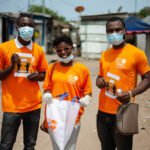About 20,000 refugees and other local community members in Nairobi, Kenya, and Kampala, Uganda, are set to benefit from a five-year employment support.
The International Rescue Committee (IRC) recently announced its readiness to provide employment support to the vulnerable groups after signing a deal with the IKEA Foundation.
The €30 million partnership, according to a statement issued by IRC, is focused on transforming livelihoods opportunities for urban refugees in East Africa.
East Africa hosts more than five million refugees from within and outside the region, with many living within rapidly growing cities such as Nairobi and Kampala.
High levels of unemployment, lack of documentation and access to financial services, and skills and language gaps restrict livelihoods opportunities for this population.
These challenges, reports say, often force the refugees to seek informal work and resort to lower wages and unsafe working conditions.
The IRC response, titled, ‘Refugees in East Africa: Boosting Urban Innovations for Livelihoods Development (Re-Build)’, aims to build upon cutting-edge research to create opportunities for refugees and others to grow businesses, find employment, and receive increased access to financial services.
The project, it was gathered, will offer apprenticeships, business grants, mentoring, skills training and certification, and more.
‘Re-Build presents a unique opportunity to break the status quo and create locally-driven partnerships focused on continuous learning’, IRC CEO, David Miliband, said.
‘It holds the potential to transform the urban refugee livelihoods sector and deliver systemic change that will provide refugees with the resources and choices they need to regain control of their lives and their futures’.
For his part, IKEA Foundation CEO, Per Heggenes, said it was critical to include refugees in East Africa in livelihood investments.
‘At the IKEA Foundation, we remain committed to helping refugees and local residents secure livelihood opportunities that enable them to earn a decent income, support their families and lead dignified lives’, Heggenes said.
The IRC and the Centre for Global Development will jointly carry out the programme’s research and advocacy work as well as share key learnings.
The programme is expected to work closely with local and regional-based private partners, civil society organisations, city authorities, and refugee and community-led bodies.
Source: IRC
Photo source: IRC






